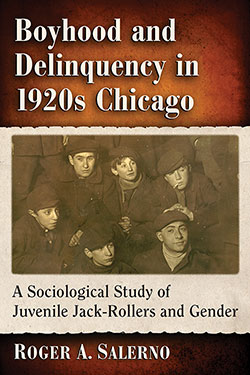Boyhood and Delinquency in 1920s Chicago
A Sociological Study of Juvenile Jack-Rollers and Gender
Original price was: $29.95.$14.99Current price is: $14.99.
In stock
About the Book
Developed by progressive social scientists in the early 20th century, the juvenile justice system in the U.S. consisted of courts and corrections aimed at reforming disorderly youth. Poor immigrant boys, roaming the streets unsupervised, were its usual subjects. Psychologists and sociologists equated maleness with innate insensitivity, lack of self-control and violent tendencies. In the belief that proper discipline would save the troubled boys from “feminization” and help control their destructive impulses, a rigid masculine authority—challenged by women activists—began to be imposed by a reactionary patriarchal system. This study of delinquency in 1920s Chicago examines the lives of boys, many of whom spent their early years incarcerated, who survived by embracing criminal personas. Predatory masculinity emerges as a source of personal struggle, and as the basis for an array of contemporary social problems, including mass violence and suicide.
About the Author(s)
Bibliographic Details
Roger A. Salerno
Format: softcover (6 x 9)
Pages: 208
Bibliographic Info: bibliography, index
Copyright Date: 2017
pISBN: 978-1-4766-6341-8
eISBN: 978-1-4766-2717-5
Imprint: McFarland
Table of Contents
Acknowledgments vi
Preface 1
Introduction: Boyhood and the Criminological Imagination 3
One. Jack-Roller Stories 19
Two. Decoding The Jack-Roller 41
Three. Shaw’s Other Boys 61
Four. Exclusions of Convenience 82
Five. Inclusions of Convenience 103
Six. Introduction to the Institute for Juvenile Research Oral Histories 111
The Lone Wolf 113
The Boy Scout 132
The Beaver 163
Conclusion: Delinquency and the End of Boyhood 182
Bibliography 189
Index 195
Book Reviews & Awards
“definitively researched scholarship…extraordinary and highly recommended”—Midwest Book Review.





